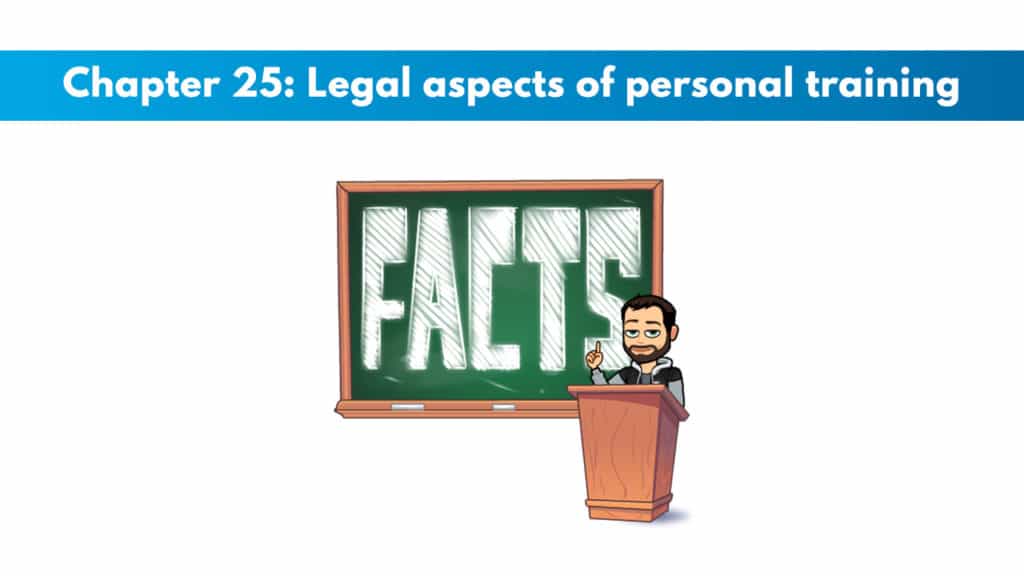
Get your copy of the NSCA CPT exam cheat sheet.
It helps immensely in studying for the NSCA-certified personal trainer exam and is provided by a veteran company in study materials, Trainer Academy.
My PTP students report cutting their NSCA study time and effort in half with Trainer Academy.
Benefit from the Exam Pass Guarantee and Retake Fee Guarantee. Plus, take advantage of my current discount code PTPJULY for 35% off the MVP Program (Ends July 21st, 2025).
Try it out for free here to see if it’s right for you, or read my detailed review for further insights.
Chapter Objectives:
- Know basic aspects of the law, particularly tort law and the legal system as they apply to deliver personal training services.
- Discuss negligence and then delineate the four elements that an injured client must prove in a lawsuit against a personal trainer based on negligence.
- Find the professional and legal responsibilities of a personal trainer and know the consequences of those responsibilities.
- Take on risk management strategies to minimize the risk of claims and litigation in personal training.
Claims and Litigation
It is important to know the process because while many trainers will never see litigations or claims due to service delivery, some might.
One of the reasons for the rise in the number of trainers that are being found in claims and suits is the tendency for the population to seek redress for anything that happens that they feel is wrong.
Exclusive PTP CPT Offers |
||
|---|---|---|
Most Popular Cert | Best Online NCCA Cert | Best Study Materials |
Gold Standard Cert | A Good Option | Best CPT for you?  |
Fitness Industry Response to Claims and Litigation
The industry has made standards and guidelines for the appropriate service delivery for trainers.
The industry has also progressed in its fitness professionals’ education, training, and certification.
The last response is that the industry has proposed legislation for regulating and licensing personal trainers.
Claims in Health and Fitness Activities
The typical claims in the health and fitness fields are:
- The application of recommendations, standards, and guidelines to deliver particular.
- Screening duties and responsibilities.
- Pre-exercise evaluation or functional testing of clients.
- Exercise or fitness activity prescriptions or recommendations to clients.
- Exercise activity supervision.
- Selection, assembly and installation, equipment maintenance, and the design and maintenance of facilities for client use.
- Emergency Response.
- Insurance.
- Releases and waivers.
- Records and ethics.
We have two sides to the law. The criminal side includes just criminal law. The civil side consists of contract law and tort law.
Criminal Law
Criminal laws are sometimes used to deal with issues relating to conduct that is prohibited and made criminal by the US federal or state statutory laws or both.
Trainers need to look out to stay within their scope of practice.
Contract Law
These are often referred to as agreements also. These involve a promise, negotiation, or bargain between two parties supported by some consideration.
In the training world, breaking contract law would mean promising to give services for a certain number of weeks and then not living up to that agreed upon contract.
Exclusive PTP CPT Offers |
||
|---|---|---|
Most Popular Cert | Best Online NCCA Cert | Best Study Materials |
Gold Standard Cert | A Good Option | Best CPT for you?  |
Tort Law
This refers to the wrongful acts or omissions between the relevant parties, typically the trainer and their client.
Negligence Claims
Tort laws require claims of negligence typically. These lawsuits require proof of certain elements by the party bringing claims against the party defending from such claims. These are based on:
- Duty
- Breach of duty
- Proximate cause
- Harm or damage
Negligence is defined as the failure of one person to comply with a legally determined duty to protect another person, which failure proximately causes the other person harm.
Defenses on Negligence Actions
Adherence to Industry Standards and Guidelines
It is important for the trainer to be prepared to support their defense for their service delivery and how it applies to the standards that are set. These standards would be the ones that apply directly to their chosen certification. This would make the case legally defensible.
Securing Proper Informed Consent for Testing
Informed consent in personal training is the process by which a procedure is described to a client that will undergo the procedure with an explanation of the risks and benefits of such a procedure. Through this process, the client will determine whether to undergo or not undergo the procedure.
Informed consent is required when participants are treated by healthcare providers also.
Assumption of Risk Prospectively Given Waivers or Release of Liability
An assumption of risk may protect a personal trainer in cases where there is a personal injury or a wrongful death. If there is no duty, then there may be no liability for injury arising from the activity.
Prospectively Given Waivers or Release of Liability
In the context of training, the waivers, also called the releases of liability, are contractual promises where one person agrees prospectively not to bring a claim or a suit if she is injured during the activity.
Insuring Against Negligence Actions or Omissions
Insurance in the context of this text is a contractual promise from the insurer where they promise to defend and indemnify the insured from certain defined liability risks at the insurer’s cost in exchange for paying a premium.
Records and Documentation
Many people involved in law are trained to ask first about the nonexistence of records that should actually be present. They will also question the poorly prepared or fully present records.
As trainers, we must keep a record of everything we can and for as long as is required by the state we reside in.
Ethical Codes
The four main parts of the NSCA code of ethics are:
Discrimination based on gender, race, religion, nationality, or age is prohibited. All clients must be treated equally, and their confidentiality must be protected.
Personal trainers should obey all relevant federal, state, and local laws, as well as all institutional guidelines and NSCA bylaws, policies, and procedures.
Personal trainers should not misrepresent their skills, training, or certification; and should provide only those services for which they are qualified.
Personal trainers should avoid professional or personal behavior negatively affecting the NSCA. For instance, they should never place their own financial gain over a client’s well-being and avoid substance abuse.
If you want assistance wrapping your head around this material, make sure to check out Trainer Academy for some awesome NSCA study materials. They have Practice tests, flashcards, and a fantastic study guide. They even offer an exam pass guarantee.

 Have a question?
Have a question? 


Tyler Read
PTPioneer Editorial Integrity
All content published on PTPioneer is checked and reviewed extensively by our staff of experienced personal trainers, nutrition coaches, and other Fitness Experts. This is to make sure that the content you are reading is fact-checked for accuracy, contains up-to-date information, and is relevant. We only add trustworthy citations that you can find at the bottom of each article. You can read more about our editorial integrity here.